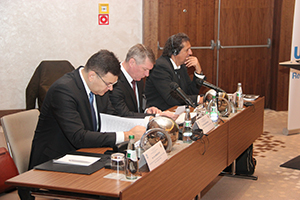 International Statelessness Conference was held in Minsk on 2 December.
International Statelessness Conference was held in Minsk on 2 December.
As mentioned in welcoming statements, this conference is the first event when government representatives can discuss some problems and share their experiences with each other.
While taking floor in welcoming statements Nikolay Melchenko, Deputy Minister of Interior Affairs of the Republic of Belarus, admitted that the participants of the Minsk conference will remain good impression. He also drew attention that the Belarusian national legislation complies with the provisions of the Convention of Statelessness. The aim of the Republic of Belarus on this issue is the reduction of statelessness, and the government will make every possible effort to resolve this issue. And it is very important that the Republic of Belarus conducts huge work on the improvement of legislation in order to resolve statelessness issues.
Yurij Ambrazevich, the representative of Ministry of Foreign Affairs of the Republic of Belarus, admitted the importance of the issue. He drew attention that the topic of statelessness is vital in the Republic of Belarus and international technical assistance will be demanded in the country. Beginning from 2011 there has been tendency in the growth of countries who signed the 1961 Convention on the Reduction of Statelessness and the 1954 Convention Relating to the Status of Stateless Persons. Although the total number of signatories is still small. Belarus is not a participant of these conventions, but to a large extent incorporated its provisions in the national legislation. Yurij Ambrozevich admitted that Belarus is interested in international technical assistance projects on statelessness issues and is ready to consider and discuss this issue in details in the framework of cross-border cooperation.
Jean Yves Bouchardy, UNHCR Representative in the Republic of Belarus, noted that nowadays there are more than 10 million stateless people (it is more than the population of the Republic of Belarus). They have lost their citizenship due to external factors (disintegration of the state, revision of borders: the former Soviet Union, Yugoslavia, the Palestinian question, Eritrea, and so on). Statelessness is a very complicated subject. About one hundred states were parties to the conventions on statelessness 2 years ago, now their number increased slightly. There are many positive examples. For example, Tajikistan granted citizenship to 650 stateless persons. UNHCR tries to draw attention to this issue. And for this reason the Conference was organized in the Republic of Belarus.
Valeria Cherednichenko, Statelessness Consultant of UNHCR Bureau for Europe, covered the legal framework and its achievement issues in the sphere of statelessness. She gave the details of the legal framework, safeguards for stateless persons, explained the essence UNHCR Mandate vis-à-vis stateless persons and UNHCR approach towards work with persons of this status. She also clarified points of stateless person identification and determination status procedure.
Elena Lebetskaya, representative from Ministry of Internal Affairs of Belarus of Department on Citizenship and Migration, explained Belarusian state system in the sphere of statelessness. In her speech she clarified the issues of legislation and responsible authorities, identification of stateless persons, documentation and naturalization.
Further the conversation was conducted in the discussion manner about experience of the EU countries in the sphere of statelessness. Giulia Perin, lawyer of «Association of Legal Studies on Immigration» (ASGI), shared Italian experience on this issue. She began her speech with the history of accession to international instruments in the sphere of statelessness, also told about challenges and solutions connected with this process. She also clarified points of Italian legislation in this sphere, peculiarities of stateless person identification and determination status procedure. Ms. Perin shared challenges and lessons learnt in the sphere of implementation of statelessness legislation and procedures. Following her presentation Ms. Perin made recommendations for Belarusian colleagues on this sphere issues.
Tamas Molnar, Head of the Unit for migration of Department of EU Cooperation of Ministry of Internal Affairs of Hungary, shared Hungarian experience on this issue. He covered the specifications of following questions: Hungarian legislation on this issue, peculiarities of stateless person identification and determination status procedure, challenges and lessons learnt in the sphere of implementation of statelessness legislation and procedures. Mr. Molnar provided Belarusian colleagues with some recommendations based on Hungarian experience.
The experience of Eastern and South Caucasus countries was also under the focus. Julian Popov, Head of Information and Statelessness Unit, Asylum and Integration Directorate, Ms. Sophie Yucer, Associate Protection Officer, UNHCR Representation in Georgia, and Ms. Ia Biganishvili, Project Manager/Lawyer at the Public Services Development Agency (PSDA) of the Ministry of Justice of the Republic of Georgia, spoke on these issues. In their speeches they passed through the main points in the framework of Conference and stressed the moments that are most inherent in their countries in the sphere of statelessness.
Each orator shared his experience and presented recommendations for Belarusian colleagues based on it.